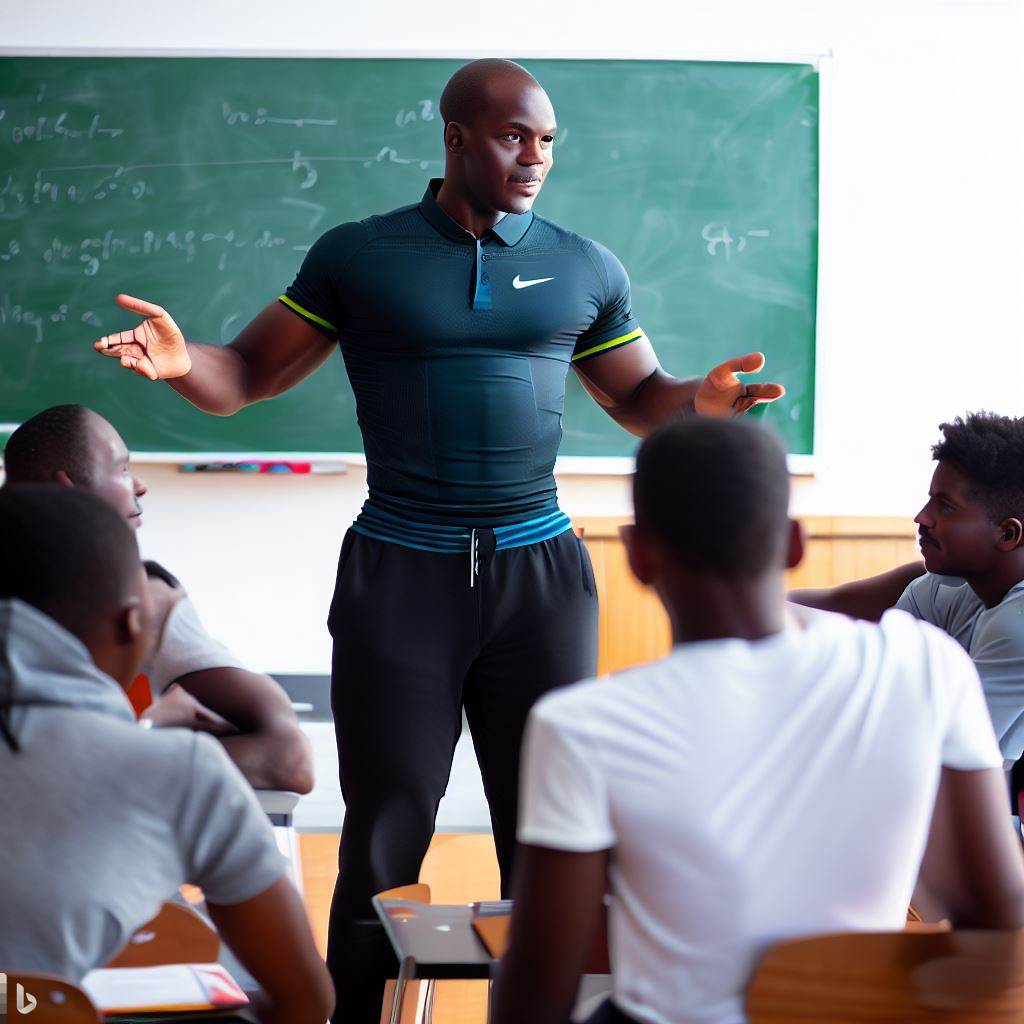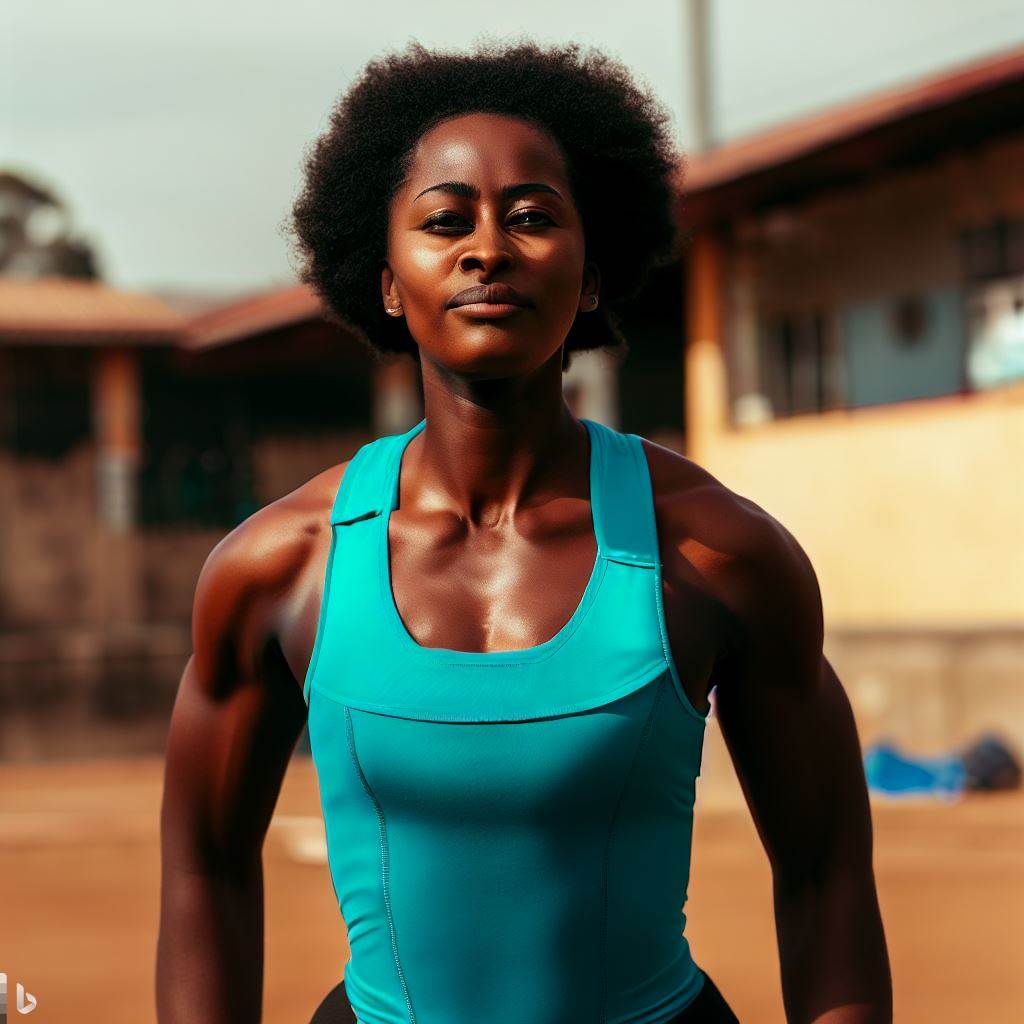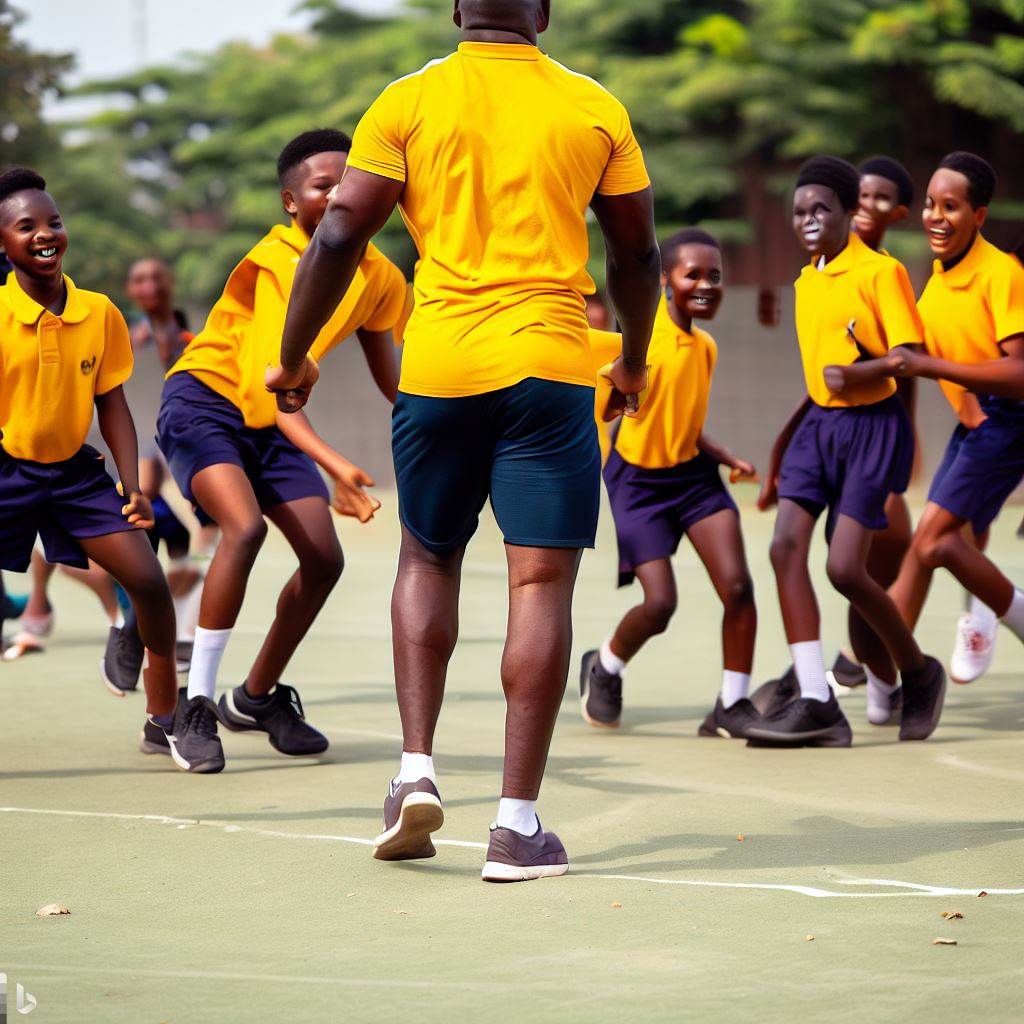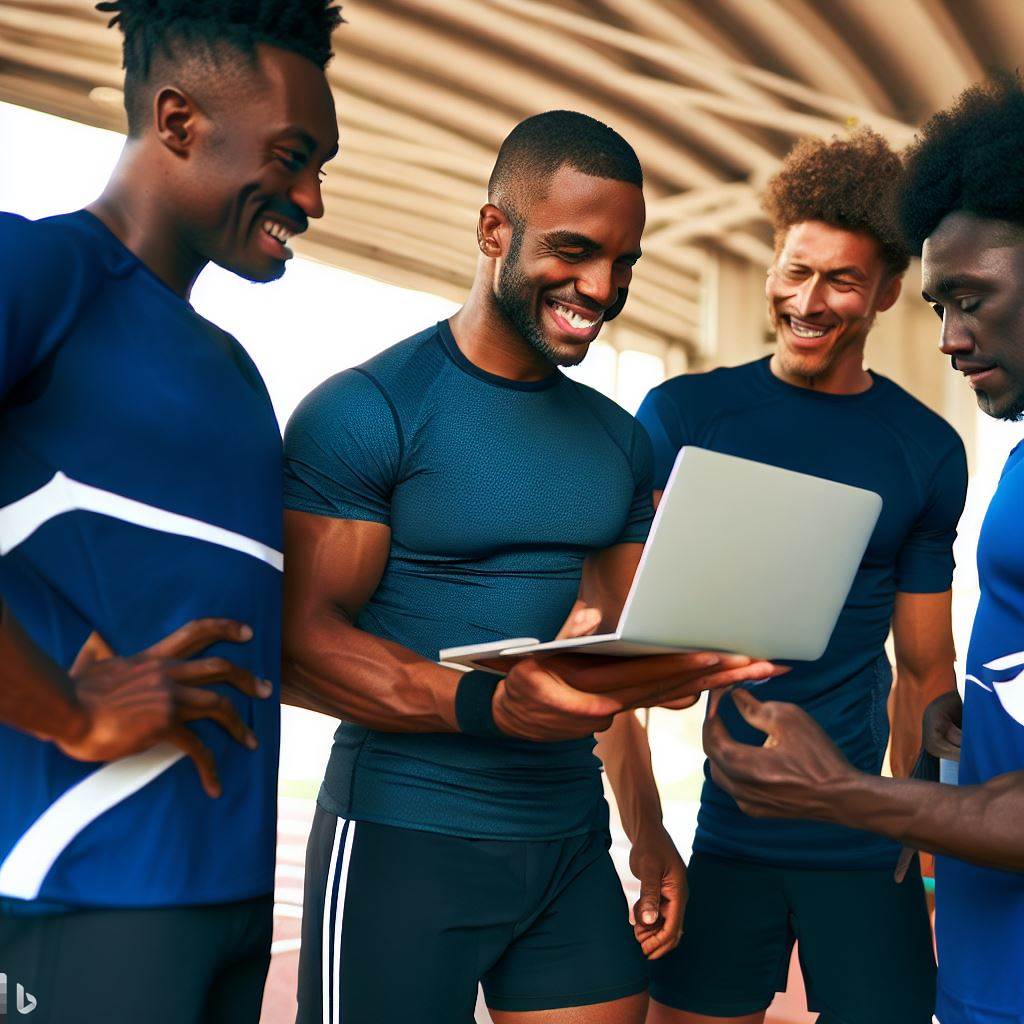Introduction
A. Importance of Athletic Training in Nigeria
Athletic training is crucial in Nigeria, fostering sports excellence, health, and national pride.
B. Current State of Athletic Training in Nigeria
The current athletic training landscape in Nigeria faces challenges like outdated facilities and limited resources.
C. Thesis Statement
The future of athletic training in Nigeria holds great potential. Experts offer insights on:
- Modernizing training methods
- Enhancing infrastructure
- Developing talent
- Promoting sports for national growth.
Join us in exploring this promising future of athletic training in Nigeria.
The Current Challenges in Athletic Training in Nigeria
A. Lack of modern training facilities
- Nigerian athletes face a major challenge due to the inadequate availability of modern training facilities.
- The absence of well-equipped sports facilities hampers the development and training of athletes.
- Without access to modern facilities, athletes are unable to reach their full potential.
- This lack of facilities not only affects the training but also the overall performance of Nigerian athletes.
- The government and sports authorities should prioritize the establishment and improvement of modern training facilities.
B. Limited access to specialized trainers and coaches
- Nigerian athletes struggle to find specialized trainers and coaches who possess the necessary expertise.
- The shortage of qualified trainers and coaches hinders the development of athletes and their skill enhancement.
- Access to specialized trainers and coaches is crucial for proper guidance and effective training.
- There is a need for increased investment in training programs to attract and retain knowledgeable trainers.
- Efforts should be made to enhance the availability of specialized trainers and coaches in Nigeria.
C. Insufficient funding for athletic programs
- One of the major challenges in athletic training in Nigeria is the lack of sufficient funding.
- Insufficient financial support limits the resources available for training and competition.
- Athletes often struggle to access proper nutrition, equipment, and other essentials due to funding constraints.
- It is crucial for the government and private organizations to allocate more funds to support athletic programs.
- Increased financial investment will enable athletes to receive the necessary resources for their development.
D. Inadequate sports science research and data analysis
- The absence of extensive sports science research and data analysis poses a significant challenge in athletic training.
- Lack of scientific data restricts the ability to create effective training programs tailored to individual needs.
- Sports science research is essential for understanding athlete physiology and improving performance.
- The development of a well-funded and robust research framework will enhance training methods and techniques.
- Collaboration between researchers, trainers, and athletes is necessary to close this gap in Nigeria’s athletic training.
Essentially, the future of athletic training in Nigeria faces numerous challenges that need to be addressed.
The lack of modern training facilities, limited access to specialized trainers and coaches, insufficient funding, and inadequate sports science research all contribute to hindering the growth and performance of Nigerian athletes.
It is crucial for the government, sports authorities, and private organizations to prioritize these issues and invest in solutions.
By improving the availability of modern facilities, attracting qualified trainers, increasing funding, and promoting sports science research, Nigeria can pave the way for a brighter future in athletic training and excel on the international stage.
Read: Athletic Trainer Equipment in Nigeria: What You’ll Need
The Role of Technology in Advancing Athletic Training
A. Integration of wearable devices for performance tracking
Wearable devices, such as fitness trackers and smartwatches, are revolutionizing athletic training in Nigeria by providing real-time performance data.
These devices can monitor vital signs, track physical activity, and even analyze biomechanics during training sessions.
Athletes can use this data to measure their progress, set goals, and make necessary adjustments to their training regimes.
The integration of wearable devices ensures that athletes have access to accurate and objective data, enabling them to optimize their performance.
B. Virtual reality and simulation training
Virtual reality (VR) and simulation training offer immersive experiences that can enhance an athlete’s skills and performance.
Through VR, athletes can practice in virtual environments that replicate real-life sports scenarios, allowing them to hone their techniques and decision-making abilities.
Simulation training also reduces the risk of injuries during high-intensity training sessions, providing a safe yet effective platform for athletes to push their limits.
In Nigeria, the adoption of VR and simulation training can bridge the gap in accessing world-class training facilities and allow athletes to train with a global standard.
C. Data analytics and personalized training programs
Data analytics plays a crucial role in athletic training by providing insights into an athlete’s performance and facilitating personalized training programs.
Coaches and trainers can analyze data collected from various sources, such as wearable devices and performance tracking systems, to identify strengths and areas for improvement.
This data-driven approach enables coaches to develop personalized training programs tailored to an individual athlete’s needs and goals.
In Nigeria, data analytics can help identify talent, optimize training methods, and potentially bridge the performance gap with other countries.
D. Telemedicine and remote coaching
Telemedicine and remote coaching have become increasingly important in athletic training, especially during times of restricted mobility and limited access to professional expertise.
With telemedicine, athletes can consult sports medicine professionals remotely, eliminating the need for physical visits and reducing costs and time constraints.
Remote coaching enables athletes to receive guidance and support from experienced trainers and coaches located in different parts of the world.
In Nigeria, the implementation of telemedicine and remote coaching can provide athletes with specialized guidance and mentorship without geographical barriers.
In essence, technology plays a vital role in advancing athletic training in Nigeria by integrating wearable devices for performance tracking, utilizing virtual reality and simulation training, implementing data analytics for personalized training programs, and incorporating telemedicine and remote coaching.
Embracing these technological advancements can elevate the quality of training for Nigerian athletes and potentially narrow the gap with other countries on the global sporting stage.
Read: Career Growth in Athletic Training in Nigeria: A Detailed Look

Expert Insights on Improving Athletic Training in Nigeria
A. Importance of investing in state-of-the-art training facilities
- State-of-the-art training facilities are crucial for the development of athletes in Nigeria.
- Access to modern equipment and technology can enhance the training experience and improve performance.
- Investment in such facilities demonstrates a commitment to the growth of sports in the country.
- Adequate funding is necessary to establish and maintain these facilities for long-term athlete development.
- State-of-the-art training facilities also attract talented athletes and help in their recruitment and retention.
B. Collaboration with international sports organizations and trainers
- Collaborating with international sports organizations allows for knowledge exchange and exposure to global best practices.
- Partnerships with foreign trainers provide access to specialized expertise and training methodologies.
- International collaborations can facilitate the identification of talent and provide opportunities for athletes to compete at international levels.
- Athletes can benefit from exposure to different coaching styles and competition systems.
- Collaborations also enhance Nigeria’s reputation in the international sporting community.
C. Promoting research and development of sports science in Nigeria
- Investing in research and development of sports science can lead to innovative training techniques and strategies.
- Sports science can provide valuable insights into injury prevention, nutrition, and performance optimization.
- Collaborations with local academic institutions can foster the growth of sports science research.
- Research findings can be used to tailor training programs specific to Nigerian athletes.
- Continuous scientific advancements contribute to the overall improvement of athletic training practices in Nigeria.
D. Strengthening grassroots participation and talent identification
- Grassroots participation programs help identify young talents with potential for athletic success.
- These programs should focus on providing access to quality coaching, facilities, and competition opportunities.
- Talent identification initiatives should target underrepresented regions and communities.
- Engaging local communities in athletic programs fosters a sense of national pride and unity.
- Strong grassroots foundations are essential for the sustainable development of athletic talent in Nigeria.
In essence, improving athletic training in Nigeria requires a multi-faceted approach.
Investing in state-of-the-art training facilities, collaborating with international sports organizations, promoting research and development of sports science, and strengthening grassroots participation and talent identification are vital components.
By implementing these strategies, Nigeria can enhance its athletic training infrastructure and nurture the next generation of successful athletes.
Read: Ethics and Professionalism in Athletic Training in Nigeria
Government and Private Sector Initiatives for Future Growth
A. Funding allocation for athletic programs and infrastructure development
- The government should increase funding for athletic programs and infrastructural development.
- Investment in state-of-the-art sports facilities will attract and nurture talented athletes.
- Developing proper infrastructure will lay the foundation for the future of athletic training in Nigeria.
- Allocation of funds for coaching staff, equipment, and sports science research is essential.
- The government must prioritize the growth of athletics by providing adequate financial resources.
B. Public-private partnerships in sports training and sponsorship
- Collaborations between the government and private sector will foster sustainable athletic training programs.
- Private companies can contribute funds, expertise, and resources to enhance athlete development.
- Incentives, such as tax breaks, can encourage corporations to invest in sports training initiatives.
- Public-private partnerships can also extend to sponsorship deals, bringing in financial support for athletes.
- These partnerships will create a mutually beneficial environment for both businesses and athletic talents.
C. Scholarships and grants for aspiring athletes
- Government and private organizations should offer scholarships and grants to talented, aspiring athletes.
- Financial aid will relieve the burden of training costs and enable athletes to focus on their development.
- Criteria for scholarships and grants should be transparent, fair, and based on merit.
- Such initiatives will provide opportunities for athletes from disadvantaged backgrounds to pursue their dreams.
- Funding aspiring athletes will contribute to the growth of athletics in Nigeria.
D. Sports academies and training camps
- The establishment of sports academies and training camps is crucial for nurturing talent.
- Sports academies can provide specialized coaching, facilities, and academic support for athletes.
- Training camps offer immersive and focused training experiences to optimize athlete performance.
- Collaboration between sports academies and educational institutions will promote holistic athlete development.
- The government and private sector should invest in the infrastructure and operations of sports academies.
Overall, the future of athletic training in Nigeria depends on proactive initiatives from the government and the private sector.
Increased funding allocation for athletic programs and infrastructure development will lay the foundation for growth.
Public-private partnerships can bring in resources, expertise, and sponsorship deals to support athlete development.
Scholarships and grants will provide opportunities for aspiring athletes, especially those from disadvantaged backgrounds.
Furthermore, the establishment of sports academies and training camps will foster talent and promote holistic athlete development.
It is essential to prioritize these initiatives to unlock the full potential of Nigerian athletes and propel the country to success in the global sporting arena.
Read: Roles and Responsibilities of Athletic Trainers in Nigeria
Conclusion
Athletic training in Nigeria has faced numerous challenges, including limited resources, inadequate facilities, and a lack of expert guidance.
However, the potential for success in Nigerian athletics is immense.
Implementing expert insights is crucial for overcoming the current obstacles and developing a strong athletic training system in Nigeria.
Expert opinions and guidance can significantly improve the quality of training programs and help athletes reach their full potential.
With the right investments in training methods and infrastructure, Nigerian athletics can prosper.
Improved facilities, accessible coaching, and the integration of sports science can elevate the performance of athletes and increase Nigeria’s competitiveness on the global stage.
Although the road ahead may be challenging, there is hope for a brighter future in Nigerian athletics.
By addressing the current limitations and utilizing expert insights, Nigeria can nurture a new generation of talented athletes and achieve remarkable success in various sports.
The future of athletic training in Nigeria depends on the collective effort of coaches, administrators, and policymakers.
It is essential to prioritize investments in training facilities, education for coaches, and the implementation of modern sports science techniques.
By recognizing the potential and addressing the challenges, Nigeria can become a powerhouse in athletics and proudly showcase its talents on international platforms.
The future is promising, and with improved training methods and infrastructure, Nigerian athletes can achieve greatness.




